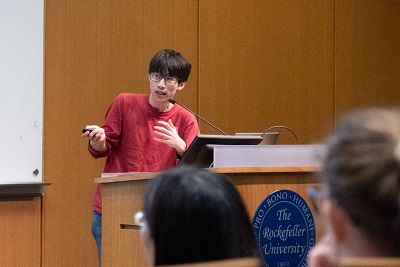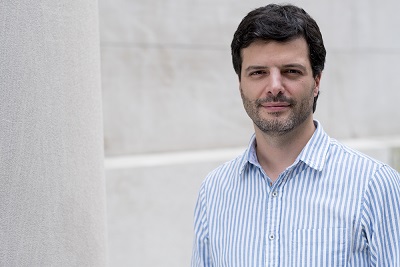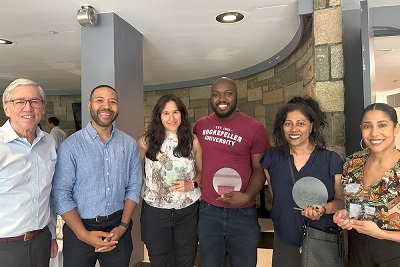Jeffrey V. Ravetch and Michael W. Young to receive Canada Gairdner International Awards
Two Rockefeller University scientists will be honored with a Canada Gairdner International Award this year, which are given for significant discoveries in medical science. Jeffrey V. Ravetch, Theresa and Eugene Lang Professor and head of the Leonard Wagner Laboratory of Molecular Genetics and Immunology, and Michael W. Young, Richard and Jeanne Fisher Professor and head of the Laboratory of Genetics, will each receive $100,000 from the Gairdner Foundation. The Gairdner, which is Canada’s highest scientific award, is considered among the top ten most prestigious international prizes in science.
“The work of these two scientists underscores the ability of basic research to benefit the field of medicine,” says Marc Tessier-Lavigne, president of The Rockefeller University. “Jeff’s work with antibodies and immune system and Mike’s findings on the molecular mechanisms of circadian rhythms and functioning have increased our understanding of how the human body works. This recognition from the Gairdner Foundation is a well-deserved testament to their dedication to science and medicine.”
The Gairdner Foundation is recognizing Ravetch for his work demonstrating how our immune system can be both protective and harmful. Using mouse models, Ravetch’s lab studies how antibodies in our immune system trigger different health outcomes by binding to molecules called Fc receptors and changing their protective activity. The Fc receptor system allows antibodies that are produced by the body to defend against toxins, bacteria and viruses. Ravetch’s discoveries on the functions of antibodies pave the way toward developing therapies for autoimmune diseases like lupus and arthritis, as well as cancer and infectious diseases.
Ravetch graduated from Yale University in 1973 and received his Ph.D. in 1978 from The Rockefeller University. He received his M.D. from Cornell University Medical College in 1979 and completed his postdoctoral research at the National Institutes of Health. After serving on the faculty of Memorial Sloan-Kettering Cancer Center, Ravetch was appointed professor at Rockefeller in 1996 and named Theresa and Eugene M. Lang Professor in 1997. Ravetch is a member of the American Academy of Arts and Sciences, the American Association for the Advancement of Science and the National Academy of Sciences and the Institute of Medicine. His previous awards include the Coley Award from the Cancer Research Institute in 2007, the American Association of Immunologists-Huang Foundation Meritorious Career Award in 2005 and the Lee C. Howley Sr. Prize for Arthritis Research in 2004.
Young, who shares the prize with Jeffrey C. Hall and Michael Rosbash of Brandeis University, is being honored for his nearly three decades of research on circadian rhythms, the biological clocks that regulate our bodies’ patterns of sleep and wakefulness, metabolism and response to disease. By studying Drosophila melanogaster, commonly known as the fruit fly, Young’s lab discovered the majority of the genes that regulate the fly’s circadian clock. Young’s findings have the potential to help individuals suffering from sleep and mood disorders as well as dysfunctions related to the timing of gene activities in visual function, locomotion, metabolism, learning and memory.
Young received his undergraduate degree in biology in 1971 and his Ph.D. in genetics in 1975, both from The University of Texas, Austin. Following postdoctoral work in biochemistry at the Stanford University School of Medicine, he was appointed assistant professor at Rockefeller in 1978 as part of The Rockefeller University Fellows Program and was named associate professor in 1984 and professor in 1988. He was named the university’s vice president for academic affairs and Richard and Jeanne Fisher Professor in 2004. He is a member of the National Academy of Sciences and a fellow of the American Academy of Microbiology. Among Young’s recent scientific awards are the 2011 Louisa Gross Horwitz Prize of Columbia University and the 2009 Neuroscience Prize of the Peter and Patricia Gruber Foundation, both of which he shared with Hall and Rosbash.
The Canada Gairdner International Awards were created in 1959 to recognize and reward the achievements of medical researchers whose work contributes significantly to improving the quality of human life. The awards will be presented at a dinner in Toronto on October 25 as part of the Gairdner National Program, a month-long lecture series given by the award winners at 21 universities across Canada, bringing the world’s best biomedical researchers face-to-face with students across the country.


